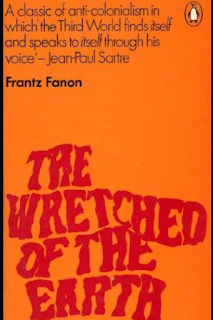Writers and scholars such as Franz Fanon have examined the effects
of colonialism on the mental health and well-being of both colonized and
colonizer, and the topic is growing in importance in the so-called postcolonial
world.
 |
| Frantz Fanon's seminal book. |
During a conference on the issue at the University of Leeds
in June, many scholars also took a closer look at neocolonial structures within
the global health system.
Sanjoy Bhattacharya, a professor in the history of
medicine, explored how the World Health Organization (WHO) claims successes for
itself - such as the defeat of smallpox. Here, he sees a Eurocentric power
structures at work as, according to his research, the dominating narrative is
that diseases stop when the WHO steps in. But this picture is highly
problematic because it ignores the efforts and contributions of developing
countries themselves, he said.
Deepika Bahri, a professor of English, discussed the aim of
colonial powers to “build a reformed class of persons in India”. In the past,
this was in keeping with the objective to “educate the body” of the colonised –
a phenomenon she calls “Biocolonialism”. Nowadays these attitudes still come
into play, especially when one looks at the global marketplace where the main
target of multinationals is to have consumers who behave the same, buying
similar products.
In addition, Bahri addressed the problem of how corporal
expressions and movements are associated with intelligence or are perceived as
a sign of an uncivilised lifestyle, such as whether one sits on the ground or
on a chair. The choice has nothing to do with one’s intelligence, but such
associations work on a subconscious level, leading to certain prejudices, she
said. In one noted example, famous personality Oprah Winfrey in 2012 made the
following comment to a wealthy Indian family on her show “The next chapter”: “I
heard some people in India eat with their hands still.”
 |
| A conference text about the issues. |
Scholars also discussed the traumas caused by colonial
oppression in spaces such as residential schools in Canada and Australia, and
they addressed sexual health, women’s health and current developments in
“postcolonial” countries.
Cultural psychologist Tarek Younis, for instance, focused
on the UK government’s “PREVENT” policies which seeks to identify individuals
who are prone to radicalisation, thus obliging health professionals to report
persons for potential crimes. According to Younis’ research, these policies
have racial implications and create a scenario close to the speculative fiction
of Philip K. Dick’s short story “Minority Report”.
Prior to the conference, Leeds University’s School of Earth
and Environment hosted a workshop on research in indigenous contexts, with a
keynote lecture. Métis presenter Zoe Todd highlighted the fact that minorities’
outrage at injustice is often regarded as overreaction - for example,
concerning missing and murdered Indigenous girls and women in Canada. She
stated that according to official reports published in June 2019, such incidents
are now rated as genocide, indicating that Native peoples did not overreact to
these “uncomfortable histories”.
Todd said that another “unhealthy” reality for research
itself is that in US academia, 94% of the hired anthropologists come from only
15 American universities. Thus, a wide range of perspectives is still being
ignored, and academia itself is driven by a few dominating institutions.
Regarding literature,
the conference spotlighted new or upcoming publications that mix humanities
with perspectives on human health and psychological and medical research. Such
publications include Humiliation: Mental Health and Public Shame by
Marit F. Svindseth and Paul Crawford (May 2019), Mad Muse: The Mental
Illness in a Writer’s Life and Work by Jeffrey Berman (Sep 2019), and the
volume on Literature, Medicine, Health from the Moving Worlds
series (Number 2/2019).

